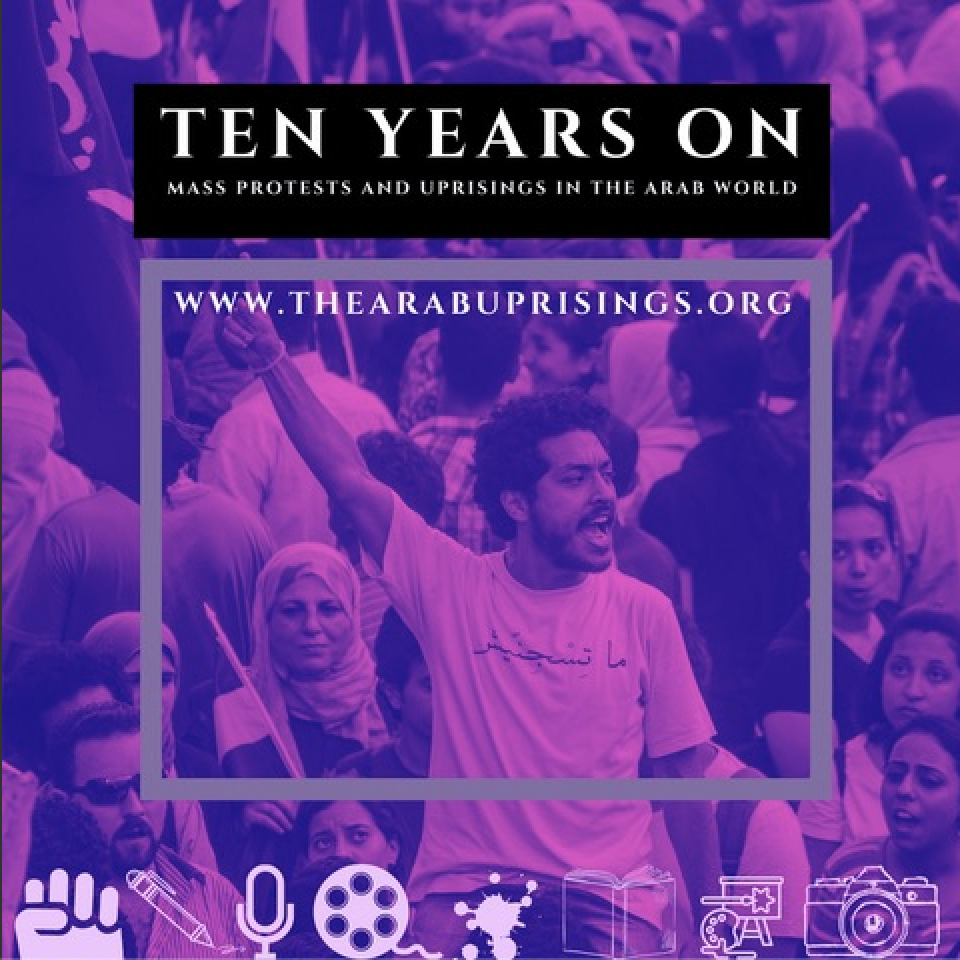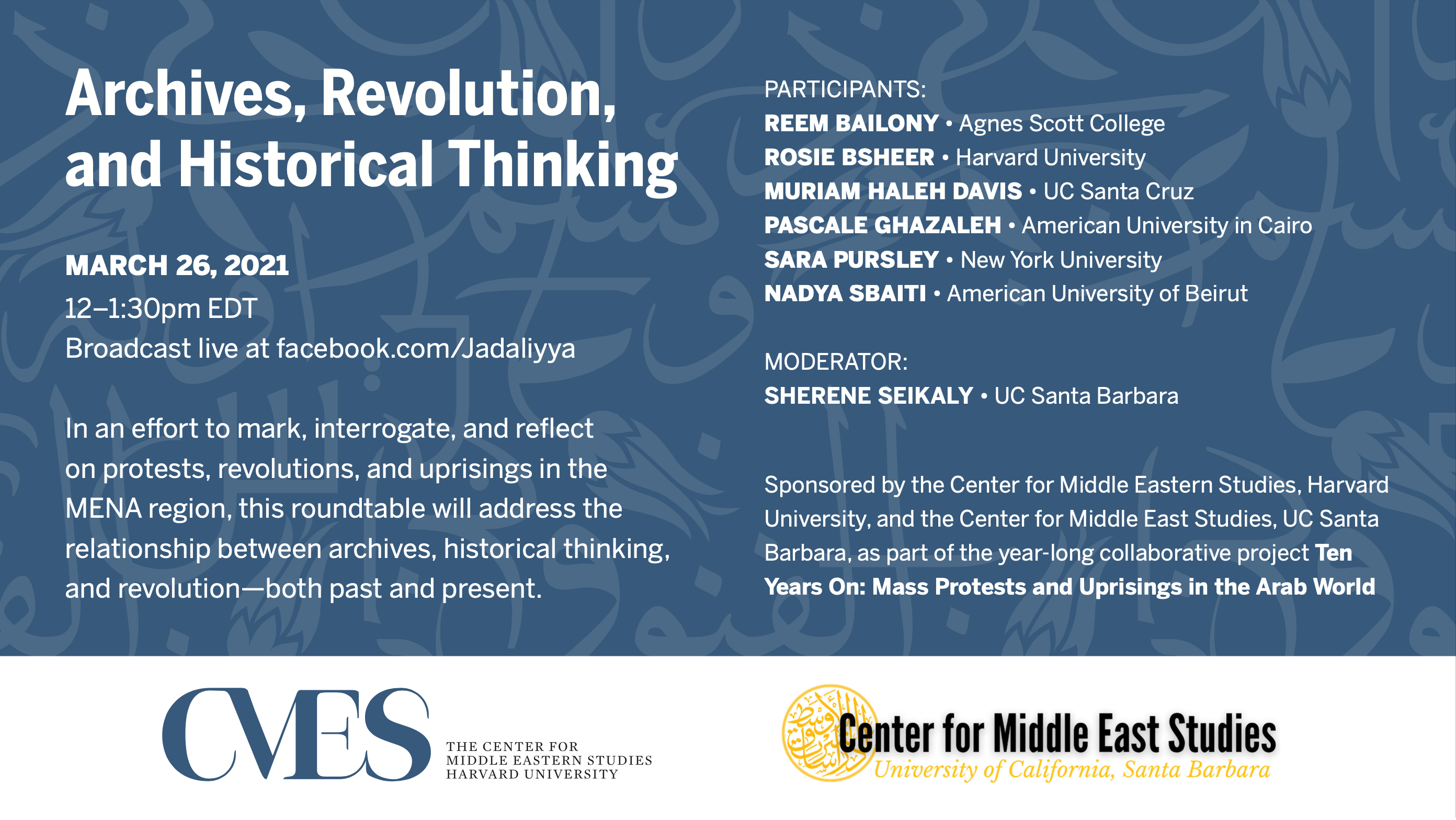The Center for Middle Eastern Studies, Harvard University and
The Center for Middle Eastern Studies, UC Santa Barbara Present:
Archives, Revolution, and Historical Thinking
More info at www.TheArabUprisings.org
This event is cosponsored by
“Ten Years On: Mass Protests and Uprisings in the Arab World” (TYO) Project
Featuring:
Reem Bailony, Agnes Scott College
Rosie Bsheer, Harvard University
Muriam Haleh Davis, UC Santa Cruz
Pascale Ghazaleh, American University in Cairo
Sara Pursley, New York University
Nadya Sbaiti, American University of Beirut
Moderator: Sherene Seikaly, UC Santa Barbara
This roundtable was organized in an effort to mark, interrogate, and reflect on various protests, revolutions, and uprisings in the Middle East and North Africa in the past ten years. Featuring a collection of scholars of the MENA region from a variety of disciplines, this event places emphasis on the relationship between archives, historical thinking, and revolution—both in the past and present.
Featuring
Reem Bailony is an assistant professor of Middle East history at Agnes Scott College. She is currently working on her book, Transnational Rebellion: The Syrian Revolt of 1925-1927, which explores Syrian-Lebanese diasporic mobilizations during the 1925 revolt against the French Mandatory government. Before joining Agnes Scott, Reem was the American Druze Foundation postdoctoral fellow at Georgetown University.
Rosie Bsheer is Assistant Professor of History at Harvard University. She is Co-Editor of Jadaliyya e-zine and Associate Editor of Tadween Publishing.
Muriam Haleh Davis is an Assistant Professor in the Department of History at the University of California, Santa Cruz. She is a co-editor of the Maghreb page on Jadaliyya and is also on the editorial committee of the Middle East Research and Information Project (MERIP). She co-edited a volume published by Bloomsbury Academic Press in 2018 entitled “North Africa and the Making of Europe: Governance, Institutions and Culture” and has published in the Journal of Contemporary History, Middle East Critique, and the Journal of European Integration History.
Pascale Ghazaleh is Assistant Professor of History at the American University in Cairo. She is the author of Fortunes Urbaines et Strategies Sociales: Genealogies Patrimoniales au Caire, 1780-1830 (Cairo: IFAO, 2010), and the editor of Held in Trust: Waqf in the Islamic World (Cairo: AUC Press, 2011).
Sara Pursley is assistant professor of modern Middle East history in the departments of Middle Eastern and Islamic Studies and of History at NYU. She is the author of Familiar Futures: Time, Selfhood, and Sovereignty in Iraq (Stanford University Press, 2019) and numerous articles, including “Ali al-Wardi and the Miracles of the Unconscious," Psychoanalysis & History 20/3 (2018): 337-51; "The Stage of Adolescence: Anticolonial Time, Youth Insurgency, and the Marriage Crisis in Hashimite Iraq," History of the Present 3/2 (2013): 160-97; and "'Lines Drawn on an Empty Map': Iraq's Borders and the Legend of the Artificial State," Jadaliyya, 2 June 2015.
Nadya Sbaiti is Assistant Professor at the Center for Arab and Middle Eastern Studies (CAMES) at the American University Beirut (AUB). She is a co-founder and co-editor of Jadaliyya.
Sherene Seikaly (Moderator) is Associate Professor of History at the University of California, Santa Barbara. She is the editor of the Arab Studies Journal, co-founder and co-editor of Jadaliyya e-zine, an editor of Journal of Palestine Studies, a policy member of Al-Shabaka, the Palestinian Policy Network, and an advisory member of R-Shief Online Archive Project. Seikaly's Men of Capital: Scarcity and Economy in Mandate Palestine (Stanford University Press, 2016) explores how Palestinian capitalists and British colonial officials used economy to shape territory, nationalism, the home, and the body. She has published in academic journals such as International Journal of Middle East Studies and Journal of Middle East Women’s Studies as well as in online venues including Jadaliyya, Mada Masr, and 7iber.
TYO is organized by: Arab Studies Institute, Princeton’s Arab Barometer, and George Mason’s Middle East and Islamic Studies Project.
Co-sponsored by: ACSS, American University of Beirut (Asfari Institute), American University of Cairo affiliates, Arab Studies Institute, Birzeit University (Department of Political Science), Brown University (Center for Middle East Studies), George Mason’s Middle East and Islamic Studies Project, Georgetown University (Center for Contemporary Arab Studies), Georgetown University (Qatar), Harvard University (Center for Middle East Studies), Institute of Palestine Studies, Princeton’s Arab Barometer, Stanford University (Center for Democracy, Development, and Rule of Law), The Global Academy (MESA Affiliated), University of Exeter (Institute of Arab and Islamic Studies), UC Santa Barbara (Center for Middle East Studies).
Ten Years On
Mass Protests and Uprisings in the Arab World
This event is part of the Ten Years on Project, a year-long series of events, reflections, and conversations created to commemorate the tenth anniversary of the start of the Arab uprisings in Tunisia. We launched this project in order to interrogate and reflect on the uprisings, with the hope of producing resources for educators, researchers, students, and journalists to understand the last decade of political upheaval historically and in the lived present.
Watch all of our previous Ten Years on events here:

